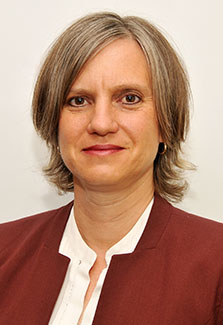From Fogarty grantee to leader at National Institute for Communicable Diseases (NICD), South Africa
January/ February 2022 | Volume 21 Number 1
Q & A with Michelle Groome, MBBCh, MSC, Ph.D.
 Michelle Groome, MBBCh, MSC, Ph.D.
Michelle Groome, MBBCh, MSC, Ph.D.
Dr. Michelle Groome is head of the Division of Public Health Surveillance and Response at the National Institute for Communicable Diseases (NICD) in South Africa and a senior clinical researcher at the University of Witwatersrand. She began her career as a medical doctor in 1997 and moved into research in 2005. Groome received a career development award from Fogarty in 2016 to study rotavirus vaccination in South Africa, specifically, the safety of the vaccine and factors influencing immune response. Her research results may inform vaccine policy decisions and rotavirus vaccine development.
Why did you choose to study rotavirus?
Rotavirus is one of the most common causes of morbidity and mortality amongst children under five in South Africa and can cause severe diarrhea, vomiting, and fever. Other than pneumonia, it is one of the most important causes of infections and hospitalizations in young children here.
My Ph.D. work involved looking at the effectiveness and impact of the oral rotavirus vaccine and how it reduced diarrheal hospitalizations in South Africa. My Fogarty grant allowed me to look closer at those findings and expand on them. One of the issues is that oral rotavirus vaccines had a significantly lower efficacy in low- and middle-income countries (LMICs) compared to high-income countries (HICs). My project allowed me to unpack some of the factors surrounding this lower efficacy to try to improve immune responses to oral vaccines. There were also safety issues as the first licensed rotavirus vaccine was associated with a rare condition called intussusception, a cause of bowel obstruction in young children. My project found that the vaccine’s health benefits outweighed the risks, alleviating some of those concerns. We also looked at how genetic factors may influence immune response.
What inspired your work?
On a personal level, my first daughter was born in 2001 and contracted rotavirus as a small child. I remember thinking she would not survive the night if we did not get her to a hospital. Thankfully, we had access to a hospital nearby and she recovered. That’s something that's always been very close to my heart. There are so many people in the world today who do not have access to a hospital nearby. With that level of severe dehydration, young children can deteriorate so quickly. I went on to have two more daughters. My youngest had the rotavirus vaccine, and it really hit home for me. Something as simple as a vaccine and the prevention of severe diarrhea can significantly impact regions without easy access to hospitals.
There’s a lot more work to be done in understanding the role of rotavirus vaccines, developing new vaccines and studying combination schedules with the oral vaccines and the newer vaccines. I am currently involved in a rotavirus clinical trial, assessing a new injectable rotavirus vaccine, which some arms of the study are receiving in conjunction with an oral vaccine. If we’re able to expand and improve the vaccine effectiveness, especially in LMICs, that would be very beneficial in terms of further reducing mortality from diarrheal disease. These research findings could provide guidance to countries that haven’t yet introduced the vaccine.
How did you benefit from the Fogarty award?
When I applied for the Emerging Global Leader Award, I didn't realize the impact it would have on my career. Having the funding to develop my research was pivotal to helping me progress in my career as a rotavirus researcher and getting to where I am today. The award allowed me to gain basic science skills, learn about immunology, and study research methodologies and statistical analysis. I’m a clinician and had done a master’s in epidemiology but I didn’t have many insights into the lab side of research. I was able to become more familiar with assays and how they worked.
The grant also enabled me to collaborate with international partners that were critical to the project. As part of this award, I had mentors in South Africa and the U.S. I had the opportunity to visit the CDC each year of the project and build relationships there. Being able to collaborate with the CDC team and to access their analytical and lab resources was highly beneficial to the project. These relationships have been instrumental in my career advancement and rotavirus research.
Today, I have a much more far-reaching public health influence in South Africa with my current position at the NICD. My award from Fogarty played a substantial role in helping me achieve that.
More Information
To view Adobe PDF files,
download current, free accessible plug-ins from Adobe's website.
Related Fogarty Programs
Related World Regions / Countries
Related Global Health Research Topics